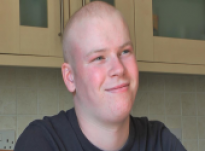Graham

The trial was on the treatment of children and young people with Hodgkin's lymphoma. Deciding to take part was confusing because of the different treatment options, but having plenty of information and talking to his parents helped and he agreed to take part.
Graham is aged 16, White British and lives at home with his parents, twin brother and other siblings. He enjoys fishing and attends a local high school. Graham was diagnosed with Hodgkins's lymphoma at the age of 16 and after the first two months of treatment was invited to take part in a clinical trial.
More about me...
Graham, aged 16, is White British and lives at home with his parents, twin brother and other siblings. Graham attends a local high school and enjoys fishing with his dad and twin brother. Graham was recently diagnosed with Hodgkin’s lymphoma and after the first two months of treatment was invited to take part in a clinical trial on the treatment of children and young people with Hodgkin’s lymphoma. Graham was unsure of the purpose of the trial but understood that it was to find out if treatment is just as successful by replacing one drug with another drug that is less likely to cause infertility, and to find out what the long term effects are of each drug on fertility.
Deciding to take part was confusing because of the different treatment options and knowing which one would be best for him. It was really helpful to have plenty of information and the opportunity to ask questions, he also discussed it with his parents. It took two weeks to make the decision, but he finally agreed to take part.
Graham wanted to take part because he felt he would receive better treatment by being in the trial and more people were looking at his tests and scans. He says the treatment hasn’t changed, he still receives chemotherapy, but the treatment plan is different and he has to attend the hospital more often. For the first treatment he attended the hospital day ward on certain days and now he is in the trial he receives the treatment in ‘blocks’ or cycles; attending the day ward, seven days of tablets at home, two weeks off, and then repeats the cycle. He will be in the trial for four months.
Taking part in the trial didn't seem any different to the normal treatment says Graham.
Taking part in the trial didn't seem any different to the normal treatment says Graham.
It was confusing with all the different treatment options, but being able to ask questions was helpful to Graham.
It was confusing with all the different treatment options, but being able to ask questions was helpful to Graham.
Although Graham experienced some side effects, he wasn't shocked because everything had been explained to him at the start of the trial.
Although Graham experienced some side effects, he wasn't shocked because everything had been explained to him at the start of the trial.

